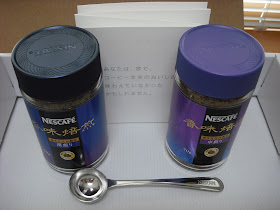ネスレは日本で日本初のレギュラーソリュブルコーヒーの先行販売を始めました。6月11日~20日まで2,000セットの注文を受け付けるというものです。私は興味をそそられ、1セット買うことにしました。
The set arrived today. It consists of:
One 70 g bottle of Nescafe Komibaisen Fukairi (Dark Roast),
One 70 g bottle of Nescafe Komibaisen Chuiri (Medium Roast), and
One original measuring spoon
2,000 yen (free shipping)
今日、届きました。次のものが入っています:
「ネスカフェ 香味焙煎 深煎り 70g」一瓶
「ネスカフェ 香味焙煎 中煎り 70g」一瓶
オリジナル計量スプーン
2,000円(送料無料)
According to Nestle's webpage, Nescafe Komibaisen is a product with a total new concept, manufactured with what they call "hiki mame zutsumi seiho" (ground beans-wrapping technique), whereby ground coffee beans are wrapped in freeze-dried coffee. 66% of those who participated in a blind test, who regularly drink regular coffee, said they preferred Komibaisen.
ネスレのウェブページによると、ネスカフェ香味焙煎はまったく新しい発想の製品で、「挽き豆包み製法」で製造されているそうです。挽いたコーヒー豆をフリーズドライコーヒーで包むというものです。ブラインドテストに参加した(普段、レギュラーコーヒーを飲んでいる)人のうち、66%の人が香味焙煎のほうがいいと答えたそうです。
I must say, however, that their new product fell short of my expectations. Not bad but not good either.
ただ、私の期待とはほど遠かったです。悪くはないですが、良くもないです。







Hey, I've been reading here for quite some time. Just wanted to say hi and ask if I understood you correctly. You didn't have soluble coffee in Japan before? This is hard to believe as there exist so many culinary gadgets in Japan! Coming from a land that really lives it's coffee-culture, a bit hard to believe. Yet I envy you for your tea-possibilities. :)
ReplyDeleteEvi: Instant coffee, also known as "soluble coffee" and "coffee powder", has been around for decades in Japan, but the coffee referred to here is "regular soluble coffee". As I mentioned in the post, it's ground coffee beans + freezed dried coffee.
ReplyDeleteI'm not a coffee geek, but I wouldn't mind paying extra for a really good cup of coffee. I feel as if I've been deceived by a world-renowned company!
Thanks for clearing that up! I didn't grasp the difference. Here we just got plain "instant coffee" but everyone seems to have those 1-cup-coffee-machines.
ReplyDeleteI understand your frustration. It just sounds like a marketing strategy without any real scientific foundation. I'm not a coffee geek either but I also like my coffee nice, "drinkable" and reasonably priced.
Hiroyuki-san,
ReplyDeleteI too have been following your writings for a little bit, and have taken advantage of many of the things you write about. Thank you for writing all of this!
On to the coffee: here in the US, Nestle instant coffees are a sort of niche market, for people who can't or won't have a coffee pot. It comes in some food service packages as an alternative, and a lot of the convenience stores used to use it where I grew up. That said, instant coffees aren't that popular where I live.
I understand your disappointment in that new product, but I hope you'll keep trying coffee at home!
RoySkull001: Thanks for your compliment. I visited your blogs and amused to see Pocari Sweat in one of them, and I'm glad to read a mention of mugicha in it. I like Pocari Sweat, but given a choice, I'd choose Aquarius, which is quite similar to Pocari but is slightly less sweet. And, I'm a great consumer of both green tea and mugicha!
ReplyDeleteInstant coffee is huge in Japan, and "Gold Blend" from Nestle is the brand I usually buy. I find other cheaper brands quite undrinkable.
As I mentioned somewhere on eGullet, my quest for really flavorful and aromatic coffee has brought me to Matsuya paper drip method:
http://forums.egullet.org/index.php?/topic/48163-the-matsuya-paper-drip-method/
The problem with the method is that it takes a very long time (and concentration and patience!) to brew coffee.
Hiroyuki: My wife and I were able to go to an excellent Japanese grocer in Seattle, Washington where I found Aquarius and tried it. I agree with you that it's better than Pocari Sweat.
ReplyDeleteRoySkull001: It's cool that you can get Aquarius and Pocari Sweat where you live! These two products and DAKARA of Suntory together account for 90% of total production of "sports drinks" in Japan.
ReplyDelete